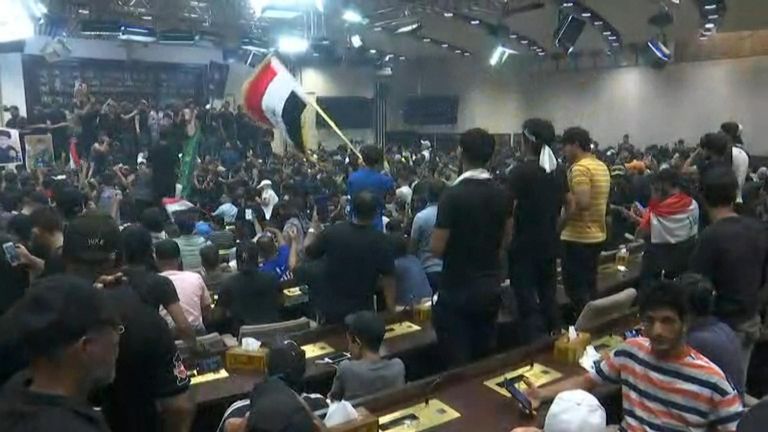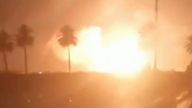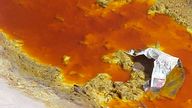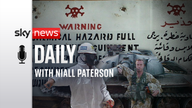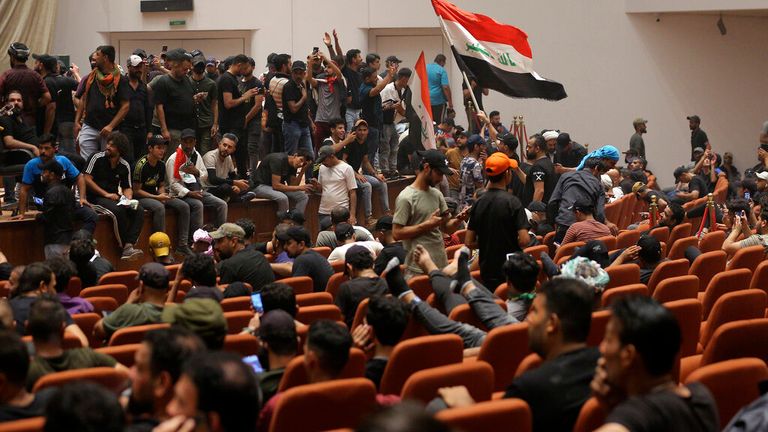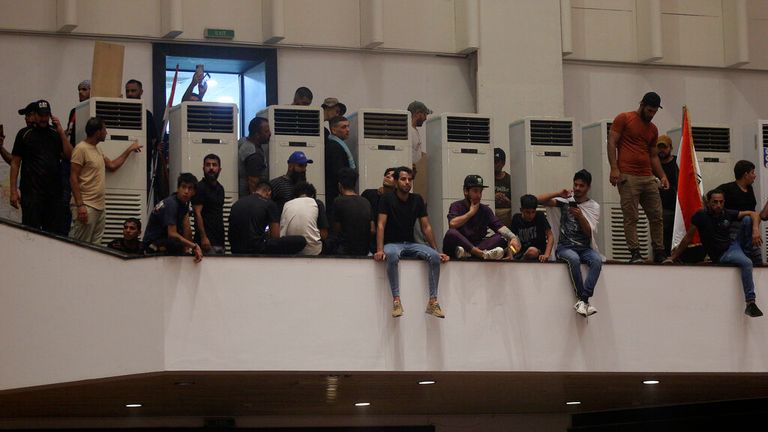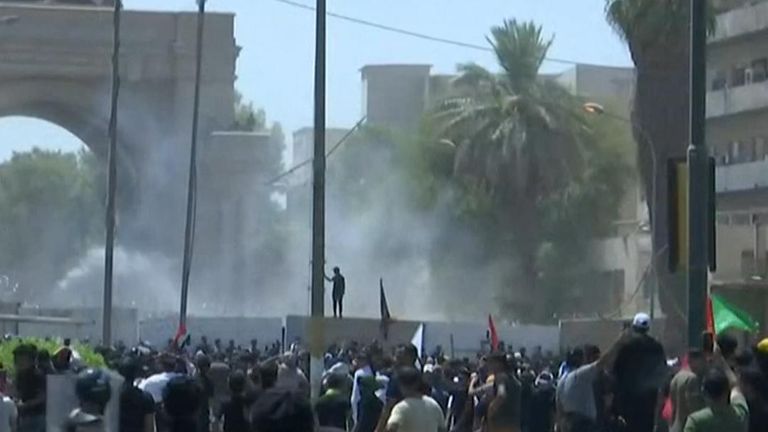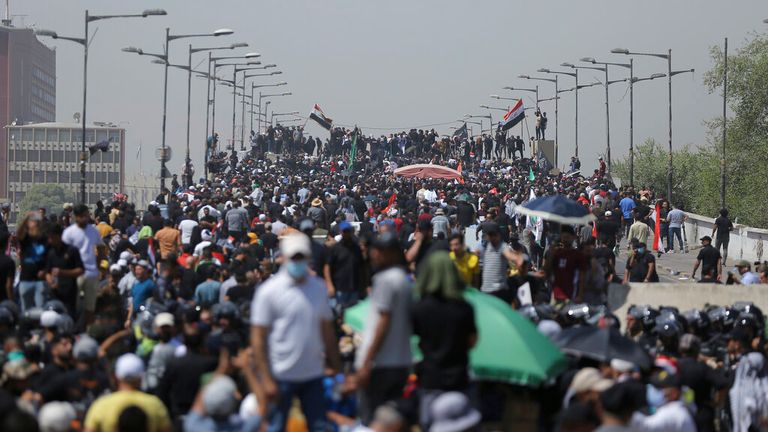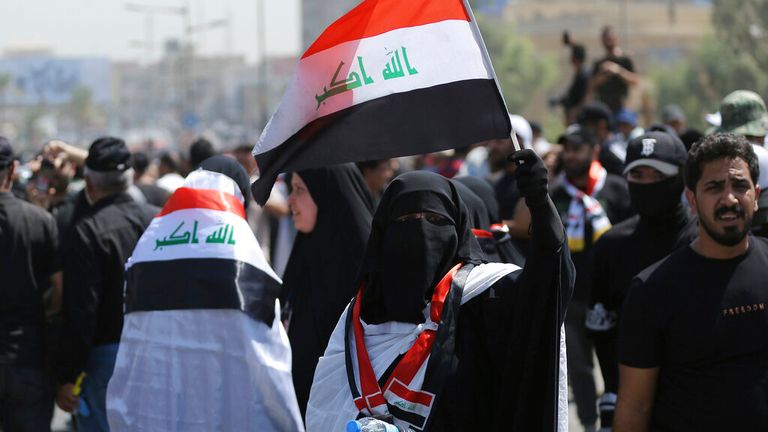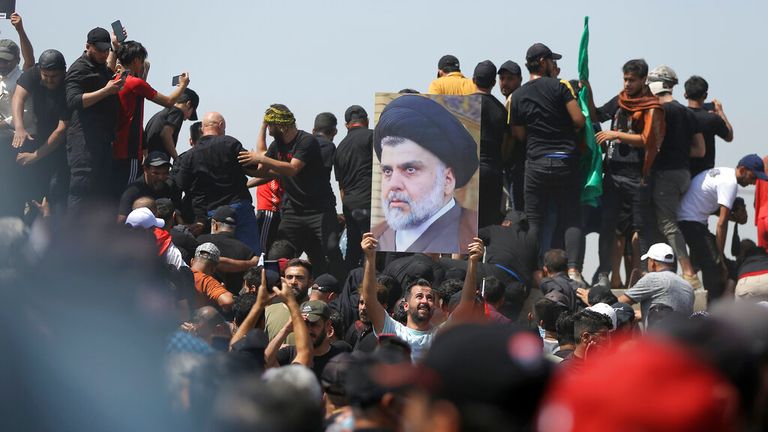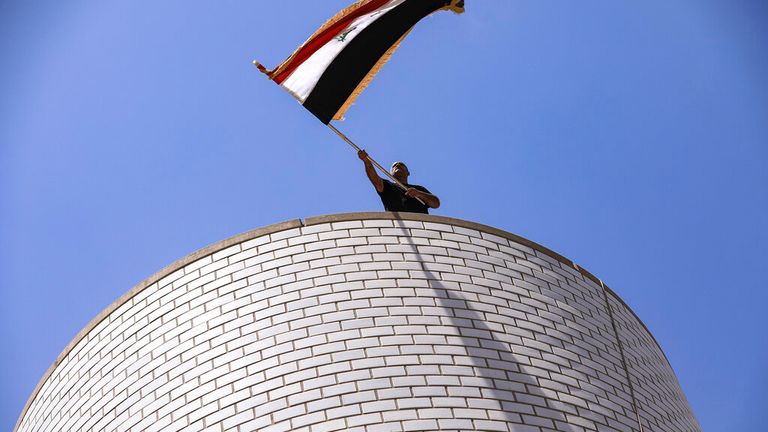Thousands of protesters breach Iraq's parliament for second time this week
Security forces have deployed tear gas and sound bombs to stop people from entering the parliament building in Iraqi capital Baghdad's Green Zone - as the country remains in the grip of political deadlock.
Saturday 30 July 2022 17:34, UK
Thousands of protesters have breached Iraq's parliament for a second time this week.
Followers of influential Shia cleric, Muqtada al-Sadr, are demonstrating against efforts by Iran-backed political groups to form the next government.
Security forces deployed tear gas and sound bombs in a bid to prevent people from entering the parliament building in the capital Baghdad.
But demonstrators used ropes to pull down cement barricades leading to the gate of the Green Zone - which is home to official buildings and foreign embassies.
At least 60 people have been injured in the clashes on Saturday, which saw an expected parliament session cancelled.
Demonstrators occupied the parliament floor and held aloft the Iraqi flag and posters of Mr al-Sadr.
The protests erupted as Iraq continues to face political deadlock, with ordinary people suffering most as a result of the stand-off.
Mr al-Sadr's party came first in a general election in October but fell short of a majority. Nine months later, no official government has been formed.
The party left talks in June after failing to form a government without Shi'ite rivals - mainly backed by Tehran.
The withdrawal handed the Coordination Framework bloc, led by Iran-backed Shi'ite parties and their allies, the majority necessary to move forward.
At least 70 people were hurt after protesters stormed the Iraqi parliament on Wednesday in protest over Mohammed al Sudani being nominated for the Iraqi premiership by the Coordination Framework.
Mr al-Sadr insisted any new government should be free of foreign influence and corruption that has plagued Iraq for decades - and has vowed civil unrest if he does not approve of the new regime.
One person among the crowds, Raad Thabet, 41, said: "We came today to remove the corrupt political class and prevent them from holding a parliament session, and to prevent the framework from forming a government.
"We responded to al-Sadr's call. We will go to the Green (Zone). No matter the cost."
Another protester, Abu Foad, said: "We are calling for a government free from corruption and those are the demands of the people."
The political stalemate is exacerbated by the fact Mr al-Sadr's loyalists are involved in running the country and hold powerful positions within Iraq's ministries and state organisations.
Caretaker prime minister Mustafa al-Kadhimi called on protesters to "immediately withdraw" as he urged people to show calm and restraint.
A statement posted on his official Twitter account on Saturday said Mr al-Kadhimi had "directed security forces to protect the demonstrators, and called on the demonstrators to remain peaceful in their movement, not to escalate, and to abide by the directives of the security forces whose goal is to protect them, and to protect official institutions."
Read more: Demonstrators breach Baghdad's parliament in protest over PM nomination in Iraq
Why is Iraq in political deadlock?
The selection of a president and the prime minister has been a painfully slow process since Saddam Hussein was toppled by the US-led invasion of Iraq in 2003.
The former Iraqi leader warned the Americans they would not be able to run the country in the wake of the war - because they did not understand the language, history, or the "Arab mind".
A former CIA analyst who debriefed the captured leader warned that had Hussein stayed, Islamic State may not have gained ground in Iraq.
In March this year, Iraq's parliament failed again to vote for a president after a boycott by Iran-backed groups.
Mr al-Sadr had hoped Rebar Ahmed Khalid, veteran Kurdish intelligence official and interior minister of Iraq's autonomous Kurdistan region in the north, would be elected.
But just 202 members of 329 attended the vote - less than the minimum two-thirds required to choose a new president - while 126 officials boycotted the session.
